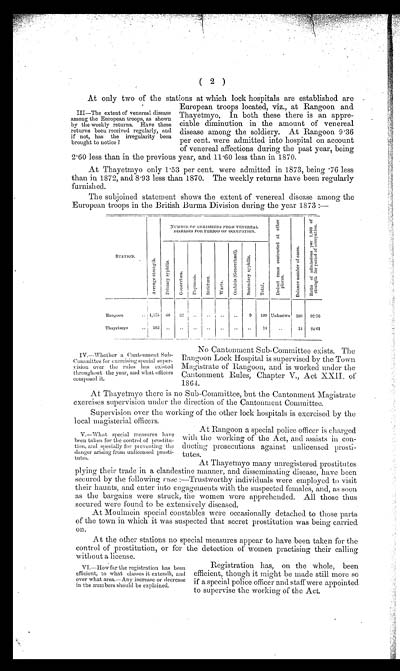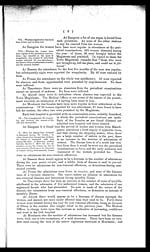Medicine - Institutions > Lock hospitals > Report on lock hospitals in British Burma > Report on lock hospitals in British Burma for the year 1873
(6) Page 2
Download files
Individual page:
Thumbnail gallery: Grid view | List view

( 2 )
III—The extent of venereal disease
among the European troops, as shown
by the weekly returns. Have these
returns been received regularly, and
if not, has the irregularity been
brought to notice?
At only two of the stations at which lock hospitals are established are
European troops located, viz., at Rangoon and
Thayetmyo. In both these there is an appre-
ciable diminution in the amount of venereal
disease among the soldiery. At Rangoon 9.36
per cent. were admitted into hospital on account
of venereal affections during the past year, being
2.60 less than in the previous year, and 11.60 less than in 1870.
At Thayetmyo only 1.53 per cent. were admitted in 1873, being .76 less
than in 1872, and 8.93 less than 1870. The weekly returns have been regularly
furnished.
The subjoined statement shows the extent of venereal disease among the
European troops in the British Burma Division during the year 1873:—f
| STATION. | NUMBER OF ADMISSIONS FROM VENEREAL DISEASES FOR PERIOD 0F OCCUPATION. |
Deduct cases contracted at other places | Balance number of cases. | Ratio of admissions per 1,000 of strength for period of occupation. | ||||||||
| Average Strength | Primary syphilis. | Gonorrhoca | Phymosis | Stricture | Warts | Orchitis(Gonorrhoeal | Secondary syphilis | Total | ||||
| Rangoon | 1,175 | 68 | 32 | .. | .. | .. | .. | 9 | 109 | Unknown | 109 | 92.76 |
| Thayetmyo | 583 | .. | .. | .. | .. | .. | .. | .. | 14 | .. | 14 | 24.01 |
IV—Whether a Cantonment Sub-
Committee for exercising special super-
vision over the rules has existed
throughout the year, and what officers
composed it.
No Cantonment Sub-Committee exists. The
Rangoon Lock Hospital is supervised by the Town
Magistrate of Rangoon, and is worked under the
Cantonment Rules, Chapter V., Act XXII. of
1864.
At Thayetmyo there is no Sub-Committee, but the Cantonment Magistrate
exercises supervision under the direction of the Cantonment Committee.
Supervision over the working of the other lock hospitals is exercised by the
local magisterial officers.
V.—What, special measures have
been taken for the control of prostitu-
tion, and specially for preventing the
danger arising from unlicensed prosti-
tutes.
At Rangoon a special police officer is charged
with the working of the Act, and assists in con-
ducting prosecutions against unlicensed prosti-
tutes.
At Thayetmyo many unregistered prostitutes
plying their trade in a clandestine manner, and disseminating disease, have been
secured by the followin ruse:—Trustworthy individuals were employed to visit
their haunts, and enter into engagements with the suspected female, and, as soon
as the bargains were struck, the women were apprehended. All those thus
secured were found to be extensively diseased.
At Moulmein special constables were occasionally detached to those parts
of the town in which it was suspected that secret prostitution was being carried
on.
At the other stations no special measures appear to have been taken for the
control of prostitution, or for the detection of women practising their calling
without a license.
VI.—How far the registration has been
efficient, to what classes it extends, and
over what area.—Any increase or decrease
in the numbers should be explained.
Registration has, on the whole, been
efficient, though it might be made still more so
if a special police officer and staff were appointed
to supervise the working of the Act.
Set display mode to: Large image | Zoom image | Transcription
Images and transcriptions on this page, including medium image downloads, may be used under the Creative Commons Attribution 4.0 International Licence unless otherwise stated. ![]()
| India Papers > Medicine - Institutions > Lock hospitals > Report on lock hospitals in British Burma > Report on lock hospitals in British Burma for the year 1873 > (6) Page 2 |
|---|
| Permanent URL | https://digital.nls.uk/75107716 |
|---|



![[Page 1]](https://deriv.nls.uk/dcn4/7510/75107715.4.jpg)
